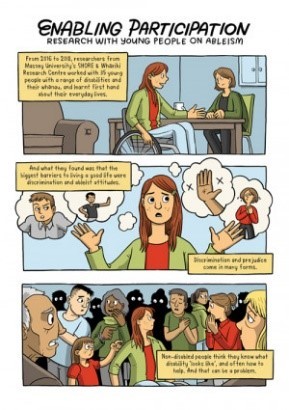Young New Zealanders with disabilities have identified discrimination and ableist attitudes as the biggest barrier to their participation in schools and communities.
This was the finding of a three-year research project, which explored the everyday lives of young people with mobility, vision and hearing impairments and examined the factors that enabled or constrained their opportunities to fully participate in community life – in education, employment, recreation and a range of other settings.
The Massey University research project, funded by the Health Research Council of New Zealand, concluded that social attitudes can undermine inclusion and participation as much, if not more than, inaccessible built environments.
The young people talked of ableist discrimination, encountered on a regular basis, which took a range of forms - from overt exclusion and prejudice to staring, unwelcome touching and inappropriate questions.
In classroom and recreational settings, many participants felt they were put in the ‘too hard’ basket. On the other hand, when leaders and facilitators were willing to work flexibly and creatively with young people to get them involved, genuine participation and inclusion was possible. School sports and physical education highlighted some of the best and worst school-based experiences of inclusion and exclusion.
Researchers Karen Witten, Penelope Carroll and Octavia Calder-Dawe stress the importance of understanding what supports full participation in school and community life. “Participation is a cornerstone of youth wellbeing, helping to build a sense of belonging and collective identity, developing networks of support, and enhancing their social and economic opportunities into the future.”
They wanted to find ways to share the young people’s insights and experiences with a wider audience, hoping to spark change and to counter ableist attitudes.
Graphic cartoon of research participants' lived experience
Guided by research participants and an advisory group of young people with disabilities, the researchers collaborated with graphic artist Toby Morris on a comic highlighting participants’ accounts of everyday ableism they encountered with people in our communities.
They hope it will raise consciousness about everyday ableism and invite and challenge people to think and act differently.
